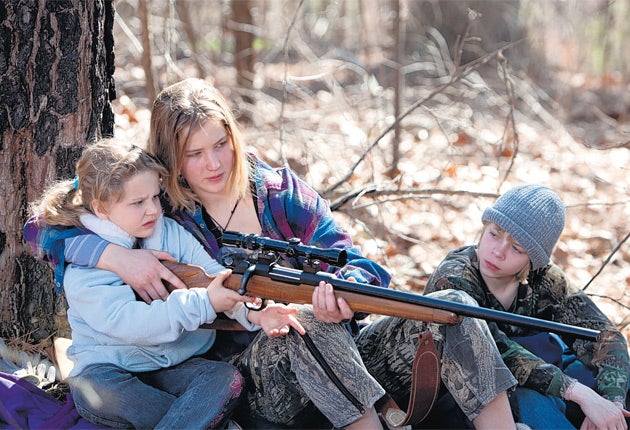Winter's Bone (15)
Where the wild things are

America still contains some remote and unnerving places, but they're usually confined to survivalist horror movies in which holidaying urbanites end up as hillbilly kebabs. The tough, tense drama Winter's Bone introduces us to a locale – the Ozark Mountains in Missouri – we don't tend to see, and to a backwoods people we don't meet, in movies or in life. It is an outcast community, clannish, close-mouthed, hostile to the authorities and bound by its own laws; its inhabitants dwell in the sort of places where they keep every last bit of junk in the front yard, and the local moonshine is crystal meth.
It's harrowing, but it's home to some, such as 17-year-old Ree Dolly (Jennifer Lawrence), who's trying to raise her younger brother and sister in circumstances close to pauper-dom. Even though they're half-starved, she tells her siblings not to beg: "You never ask for what ought to be given". This girl is proud, and determined, though how she came by such qualities is uncertain. Her mother is a mute, near-catatonic presence among them; her father, who cooks meth for a living, has just skipped bail and put the Dolly homestead up as bond. If he's not found, dead or alive, within a week, the bail company will take the house and make the family destitute. In tracking down her errant father, Ree will have to ask for something after all – help – and it proves to be a bitterly rare commodity among her mountain neighbours.
The film, adapted by director Debra Granik and Anne Rosellini from the novel by Daniel Woodrell, establishes a formidable tension between mystery and matter-of-factness. Ree's quest for her father draws her deep into this back-country, where she encounters folk who may be her kin yet want nothing to do with her. They wear expressions that are closed, like prison doors, and by degrees we learn two salient things about this community. One, it is a place where the man's word is law, and women do their bidding. Two, it is infested, silently but irremediably, by drugs, whether in the perilous economy of meth-cooking ("crank") or in the casual transactions of daily routine ("here's a doobie for your walk home", says a neighbour to Ree). The figure embodying both of these local characteristics is Teardrop (John Hawkes), Ree's father's older brother, whose feral gaze and brutish manners initially suggest that the bad seed of the family might be a close contest. He takes a quick snort of coke like a rat sniffing blood. I can't think of a more authentically scary character in recent movies.
What Granik and her cinematographer Michael McDonough do, unhurriedly yet so compellingly, is to seal us within this hardscrabble milieu and its unyielding, lawless atmosphere. The camera keeps nosing into rooms where the locals, plucking on their banjos (try not to think of Deliverance) or hunched over a card-table, will look round whenever a stranger enters, their faces blankly unwelcoming. When Ree tracks down the clan chief, Thump, who has already declined a meeting with her, in a busy cattle-market, the setting is made memorable by the babble of the auctioneer mingling with Dickon Hinchliffe's sinister keening music, a beautiful and eerie evocation of otherness. There is barely a reference to modern communication – no mobiles, no computers, not even a radio. This is an America that's been left behind, and somehow knows it.
The film was shot on the story's native turf of Missouri, and in the homes of real families. Some of the cast were recruited from the locals, enhancing its feel of authenticity.
The most vital role, though, belongs to Kentucky-born 20-year-old Jennifer Lawrence, in whose unflinching blue eyes and wide cheekbones we discern a self-command absolutely right for her character. (She looks a little like a young Renée Zellweger). A teenager with barely a friend and no visible moral guardian, Ree is so resourceful as to be an enigma: what forces have shaped this hardy soul? When she teaches her two young siblings how to fire a hunting rifle, and later how to skin a squirrel, you notice not just her own common sense but her motherly patience in dealing with her squeamish brother, aghast at the creature's stringy innards (I was very much with the boy on this one).
Matching Lawrence in intensity, if not quite comeliness, is Dale Dickey as the clan chief's wife, Merab. Her reaction to Ree's arrival on her doorstep is a nice mixture of plain-speaking hostility and suppressed admiration – she perhaps detects a little of her own cussedness in the girl. And it's Merab who shows the stomach for the repulsive payment of dues at the end; Lady Macbeth herself never cleared up a crime scene as boldly as this one does.
Winter's Bone really is one to treasure, for its skilled, economical storytelling, its committed sense of place and its full-blooded playing. But it has something else, something that nearly all great films have, which is an ability to surprise us. It registers in small moments, such as Ree's panicked appeal to her unspeaking mother ("please tell me what to do"), and in whole scenes, the best of them when Ree tries to enrol in the army, because she's heard they pay new recruits $40,000.
It's not the desperation of her plan that surprises, nor the naivety of Ree's belief that she can take along her brother and sister to wherever she's posted. It's the fact that the recruiting officer (played by Russell Schalk, who may be an actual recruiting officer) is, out of all the strangers Ree applies to, the one who shows himself the gentlest and most understanding. That's right, a member of the US military comes out tops. I loved the film for that, and for much else.
Join our commenting forum
Join thought-provoking conversations, follow other Independent readers and see their replies
Comments